
Informational site provides illustrated tutorial of light reflection. Also discusses the law of reflection.

Informational site provides illustrated tutorial of light reflection. Also discusses the law of reflection.

The invention of the telescope helped change our understanding of the universe. This video segment adapted from NOVA looks at Galileo's contribution to this technology. [1:49]

This video from NASA describes the GLAST satellite, which is equipped with a gamma-ray telescope, and shares some background about the kinds of extreme universal phenomena indicated by the presence of gamma rays.

This video segment from Swift: Eyes through Time introduces and explains theories of the origin of gamma-ray bursts.

The meaning and cause of refraction--as well as Snell's law of refraction--are discussed. Includes an interactive problem-solving form in which visitors relate angles of refraction to the incident angle and the indices of refraction.
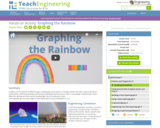
Students are introduced to different ways of displaying visual spectra, including colored "barcode" spectra, like those produced by a diffraction grating, and line plots displaying intensity versus color, or wavelength. Students learn that a diffraction grating acts like a prism, bending light into its component colors.
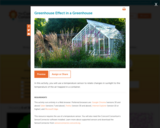
Build your own miniature "greenhouse" out of a plastic container and plastic wrap, and fill it with different things such as dirt and sand to observe the effect this has on temperature. Monitor the temperature using temperature probes and digitally plot the data on the graphs provided in the activity.
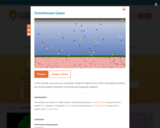
Explore how the Earth's atmosphere affects the energy balance between incoming and outgoing radiation. Using an interactive model, adjust realistic parameters such as how many clouds are present or how much carbon dioxide is in the air, and watch how these factors affect the global temperature.
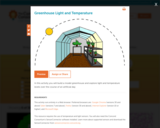
Make your own miniature greenhouse and measure the light levels at different "times of day"--modeled by changing the angle of a lamp on the greenhouse--using a light sensor. Next, investigate the temperature in your greenhouse with and without a cover. Learn how a greenhouse works and how you can regulate the temperature in your model greenhouse.
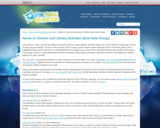
This article features science lesson plans to teach elementary students about the sun's energy, the relationship between light and heat, albedo, and the absorption of different surfaces. National standards and literacy integrations are provided for each lesson.
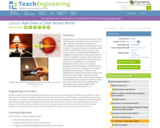
Students learn more about how light sensors work, reinforcing their similarities to the human sense of sight. They look at the light sensing process incoming light converted to electrical signals sent to the brain through the human eye anatomy as well as human-made electrical light sensors. A mini-activity, which uses LEGO MINDSTORMS(TM) NXT intelligent bricks and light sensors gives students a chance to investigate how light sensors function in preparation for the associated activity involving the light sensors and taskbots. A PowerPoint® presentation explains stimulus-to-response pathways, sensor fundamentals, and details about the LEGO light sensor, including its two modes of gathering data and what its numerical value readings mean. Students take pre/post quizzes and watch a short online video. This lesson and its associated activity enable students to gain a deeper understanding of how robots can take sensor input and use it to make decisions via programming.

In this video segment adapted from Shedding Light on Science, observe demonstrations of the fundamental idea that light travels in straight lines.

In this video segment adapted from Shedding Light on Science, students will observe demonstrations of the fundamental idea that light travels in straight lines. [1:57]
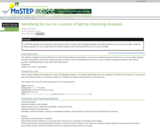
This activity is a kindergarten field and classroom investigation where students make observations, collect data and share conclusions that shows they understand that the sun is a source of light.
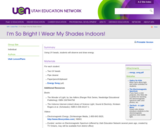
In this lesson students will use UV beads to observe and draw energy. Students will describe how light can be produced, reflected, refracted, and separated into visible light of various colors.

From holiday string lights to the bright sun in the sky, light is everywhere around us - but what really is light? Get all your questions about light answered by Berkeley Lab scientists Baishakhi Bose, Mayank Sabharwal, and Yu Gao during December's After School Science Hour about the inner life of light. You'll also get to make your own sky simulator and learn the reasons behind the sky's changing colors

Video provides a basic introduction to the phenomenon of light, the electromagnetic radiation spectrum, wave and particle-like behavior, and how to calculate the wavelength or frequency of a light wave. [9:36]
Khan Academy learning modules include a Community space where users can ask questions and seek help from community members. Educators should consult with their Technology administrators to determine the use of Khan Academy learning modules in their classroom. Please review materials from external sites before sharing with students.

This animation from KET's distance learning physics course demonstrates the mathematical formula for a scientific law as it applies to light.
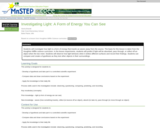
This is a short unit (including hands on activities) to expand our study of how light travels and how it behaves when it hits an object.
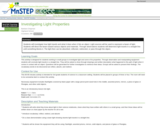
This activity is lab oriented where students will observe that light travels in a straight line and is reflected, redirected, absorbed, or passes through objects.